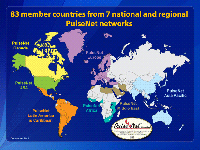Stories From the Field
PulseNet International: Tracking foodborne disease outbreaks throughout the world
In February 2007, millions of Americans heard news reports about a large multi-state outbreak of Salmonella traced to peanut butter produced in Georgia. Because foodborne disease outbreaks do not respect borders, and with increasing international trade of food, CDC's PulseNet program was also working closely with federal and international partners to ensure global detection of the outbreak.
PulseNet USA is the national surveillance network for foodborne infections. Members of PulseNet USA include public health and
food regulatory agency laboratories that perform DNA "fingerprinting" on bacteria that may spread through food. Network members identify and label each "fingerprint" pattern for rapid comparison through an electronic database maintained at CDC. This helps identify and track particular strains of bacteria that are harmful to human health.
During the Salmonella outbreak, PulseNet International, a global network modeled after U.S. PulseNet, informed network countries that the contaminated product had been exported to many countries. Suspect cases were reported in several European countries, but tests ultimately showed none had the "fingerprint" identified in the U.S. outbreak.
PulseNet International has confirmed global cases in other outbreaks. One example is an outbreak of shigellosis that was associated with air travel from Hawaii in 2004. By sharing DNA fingerprints from the bacterial strains isolated from patients, public health officials confirmed cases in the United States, Canada and Japan.
Today [second quarter 2007], 67 countries/regions are members of the PulseNet International network. Goals for PulseNet International include:
- Developing partnerships between public health laboratories throughout the world
- Establishing efficient communication systems between the networks
- Building capacity for molecular surveillance of foodborne infections
Today, PulseNet USA and PulseNet Canada are sharing data in real-time through direct connection between their respective databases. This real-time communication is also planned with the other PulseNet networks. PulseNet International is currently exploring the possibility of establishing PulseNet networks in Africa and the former Soviet Union. This work is done in cooperation with WHO's Global Salmonella Surveillance program (WHO GSS). These expanded collaborations are expected to further improve global surveillance and control of foodborne diseases, which in turn will lead to fewer people being affected by foodborne infection worldwide.
For the original story and more information, see CDC Global Health E-Brief [PDF - 5 pages].
Contact Us:
- Centers for Disease Control and Prevention
1600 Clifton Rd
Atlanta, GA 30333 - 800-CDC-INFO
(800-232-4636)
TTY: (888) 232-6348
24 Hours/Every Day - cdcinfo@cdc.gov



